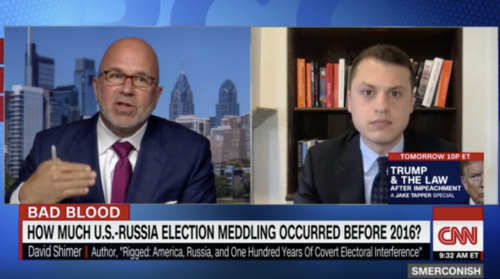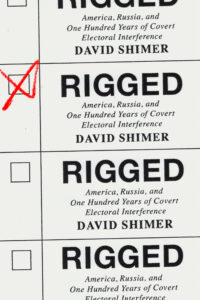
This month, I had the pleasure of catching up with Chappaqua’s David Shimer, the author of the new and much heralded book Rigged: America, Russia, and One Hundred Years of Covert Electoral Interference (Knopf; June 30, 2020), which examines the century-long history of election interference. In glowing reviews, the Washington Post called Rigged “newsworthy,” “absorbing,” and “damning,” and NPR described Rigged as an “authoritative book” and “fascinating reading.” General David Petraeus, a former CIA director, labeled Rigged “a clear-eyed, highly readable, meticulous history of foreign electoral interference, in which revelations abound.” And Timothy Snyder, the author of On Tyranny, has said that Rigged “should be read by everyone who wants to defend democracy now.”
Shimer is also a member of the Chappaqua community. He was the valedictorian of his class at Horace Greeley High School (class of 2014), received his bachelor’s and master’s degrees in history from Yale, and is currently pursuing his doctorate in international relations at the University of Oxford as a Marshall Scholar. Shimer has reported for the New York Times from five countries, and his foreign policy analysis has appeared in the Washington Post, Foreign Affairs, and the New Yorker. With so much at stake ahead of November, Rigged strikes me as an essential and timely book, so I thought I would pick Shimer’s brain about Rigged and the threat of Russian meddling in the 2020 election. (The link to purchase is here.) – Grace Bennett
What precipitated the writing of Rigged?
The idea for Rigged first emerged in my mind in the summer of 2017. At the time, I was reporting for the New York Times from Berlin, and Russia had just interfered in America’s presidential election. While in Germany, I spent several hours interviewing a former Stasi officer named Horst Kopp. He told me about a covert operation he helped execute in 1972, to interfere in a vote of no confidence in West German Chancellor Willy Brandt. Because of the Stasi’s intervention, the vote failed, and Brandt remained in power. This story fascinated me: A foreign intelligence service had changed the outcome of a democratic vote of succession. I spent the next year researching the Stasi’s operation under the supervision of Timothy Snyder, a professor at Yale.
I then went to Oxford to pursue my doctorate, by which point I was set on studying the evolution of foreign operations to interfere in electoral processes. My research took on a life of its own. I became obsessed with this topic, because I was and remain convinced that studying the past is essential to understanding Russia’s attack in 2016 and to defending our elections moving forward. I ended up traveling across six countries examining KGB, CIA, and Stasi archives and interviewing more than 130 people, including eight former CIA directors and a former KGB general. The result is Rigged, which restores history to the subject of covert electoral interference, examines Barack Obama’s struggle to defend against Russian interference and Donald Trump’s refusal to recognize this threat, and explains what our country should be doing to secure its elections today.
If you could choose three takeaway messages you’d like readers to remember from your book, what would they be?
 The first is that Russia’s 2016 operation marked the evolution rather than the creation of a practice. For about a century, with brief interruptions, Moscow has been targeting elections all over the world, including in the United States. The KGB sought to interfere in America’s 1960, 1968, 1976, and 1984 elections, as I detail in my book, with tactics eerily reminiscent of Putin’s. Across these operations are patterns that can and should instruct our response to the Russia threat. The most basic one is that covert electoral interference always involves efforts to manipulate voters or to alter actual ballots. To defend an election is to defend against both forms of attack.
The first is that Russia’s 2016 operation marked the evolution rather than the creation of a practice. For about a century, with brief interruptions, Moscow has been targeting elections all over the world, including in the United States. The KGB sought to interfere in America’s 1960, 1968, 1976, and 1984 elections, as I detail in my book, with tactics eerily reminiscent of Putin’s. Across these operations are patterns that can and should instruct our response to the Russia threat. The most basic one is that covert electoral interference always involves efforts to manipulate voters or to alter actual ballots. To defend an election is to defend against both forms of attack.
Second, the United States was more exposed in 2016 than is publicly understood. I interviewed 26 former advisors to Barack Obama, including John Brennan, Susan Rice, Jim Clapper, Leon Panetta, and David Petraeus. From those conversations I learned that in the summer and fall of 2016, the Obama administration’s foremost concern was that Russian hackers would alter the voter data and even the vote tallies of American citizens. On Election Day itself, a secret crisis team in the White House was bracing for Russian intelligence to manipulate our voting systems. All the while, Russian actors were manipulating American voters across social media and with hacked emails, and Putin suffered no consequences for doing so until after the election.
And finally, it is essential for readers to recognize the purpose behind Russia’s electoral operations: to undermine our democracy and the democracies of the world. During the Cold War, the Soviet Union interfered in elections in order to advance communism, an ideology. Putin has adopted a subtler strategy. He is interfering in elections here and abroad in order to promote divisive and authoritarian-minded candidates, sow chaos, and delegitimize the democratic process of succession. Putin likes candidates like Trump because they degrade their democracies from within.
Can you tell us about the special relevance of your book to the upcoming election?
Reports have already emerged that Russia is interfering in the 2020 election. The sovereignty of our democracy is on the line. What I do in my book is provide a basis to understand operations like Russia’s, to reanalyze 2016 with an eye toward the future, and to elucidate how Americans can help to safeguard their democracy this November and beyond.
What can Russia do to interfere in the 2020 election?
The first question on my mind is how Russia will seek to manipulate public opinion between now and November. In 2016, to sow division and advantage Trump, Russian actors stole and released Democratic Party emails and spread propaganda across social media. Something history reveals is that these types of tactics, to influence voters, are constantly evolving. It remains to be seen what’s next.
The second question is whether Russia will escalate from influencing voters to altering actual votes. In 2016, Russian hackers penetrated election systems across the United States. The day of the election, Obama’s security chiefs believed that Russia could manipulate the ballot box in Trump’s favor. There is no guarantee that Putin will refrain from authorizing such an attack this time around. In fact, he may feel emboldened to act more aggressively, because Barack Obama, who at least tried to defend our elections, is no longer president. In his place is a president who has openly invited Russia and China to take steps that would help him electorally. Some of the Trump administration officials I interviewed acknowledged that Putin must realize that Trump will not punish him for manipulating the 2020 election, so long as he benefits. Putin is the type of leader who pushes as far as he can without provoking much pushback. And with Trump, there is never any pushback when it comes to Russia.
What can we do to protect our elections?
Joseph Stalin and his successors spent decades trying to spread communism, so we contained communism. Today, Putin is working to tear apart democracies from within, so we need to renew our democracy and help our allies do the same. This process starts at home. The United States should be fortifying its electoral infrastructure, to ensure that Russia cannot alter the votes of American citizens, while also reducing the effectiveness of operations to manipulate voters. And abroad, the next president should lead a coalition of democracies against the threat of covert electoral interference. I explain how to achieve both of these aims in Rigged, which I hope my fellow community members will read!
